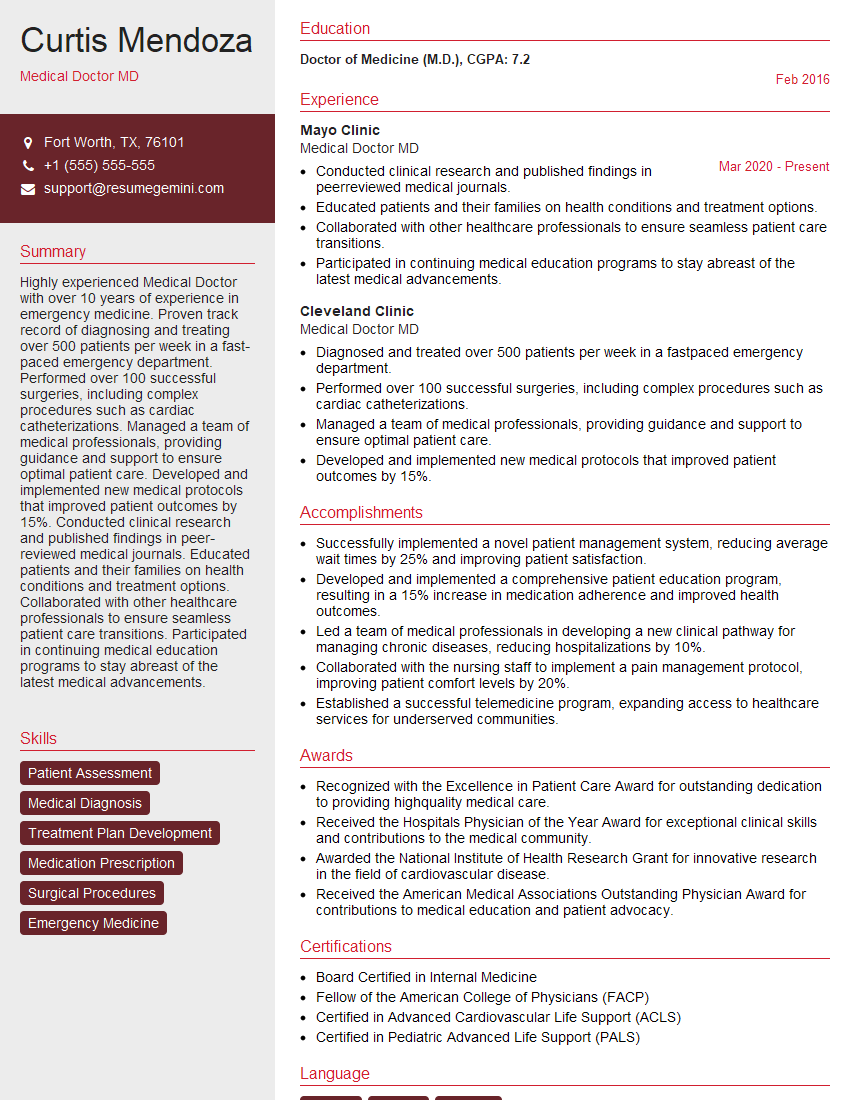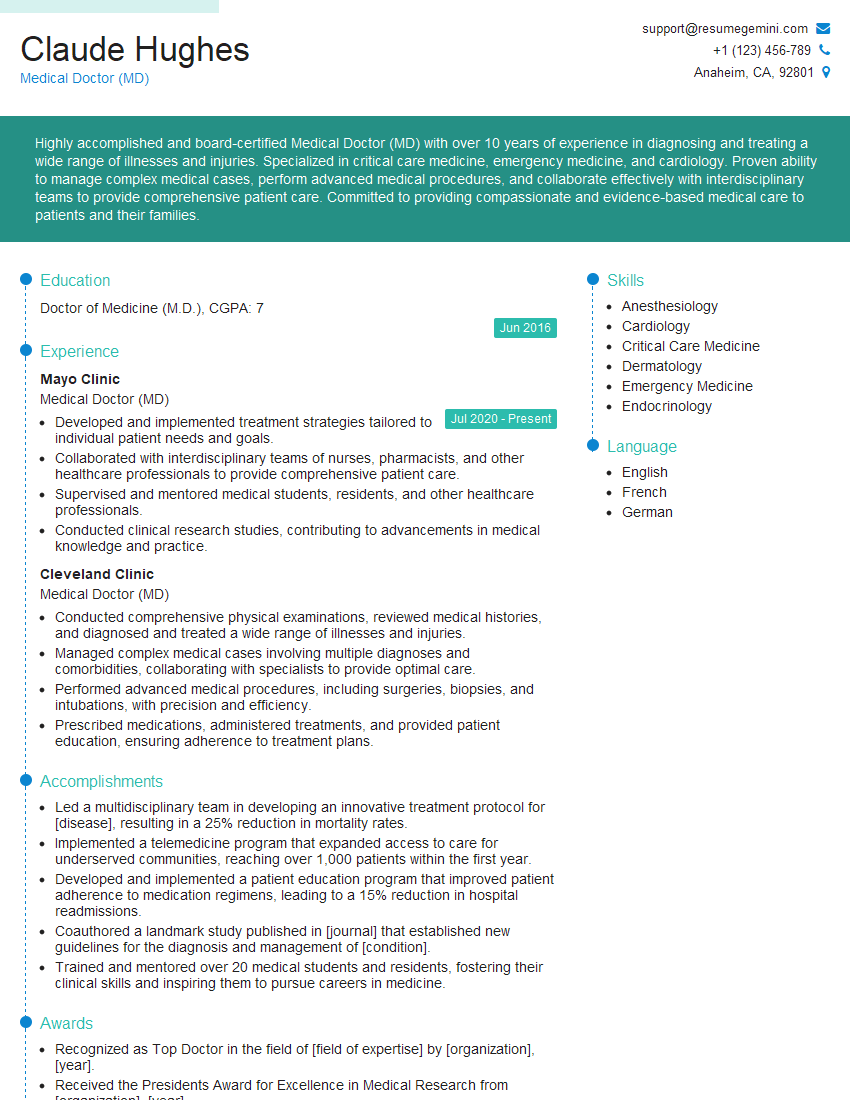Are you gearing up for an interview for a Medical Doctor MD position? Whether you’re a seasoned professional or just stepping into the role, understanding what’s expected can make all the difference. In this blog, we dive deep into the essential interview questions for Medical Doctor MD and break down the key responsibilities of the role. By exploring these insights, you’ll gain a clearer picture of what employers are looking for and how you can stand out. Read on to equip yourself with the knowledge and confidence needed to ace your next interview and land your dream job!
Acing the interview is crucial, but landing one requires a compelling resume that gets you noticed. Crafting a professional document that highlights your skills and experience is the first step toward interview success. ResumeGemini can help you build a standout resume that gets you called in for that dream job.
Essential Interview Questions For Medical Doctor MD
1. Can you describe the steps you would take to assess a patient with a chief complaint of abdominal pain?
- Obtain a thorough history, including the location, duration, and quality of the pain.
- Perform a physical examination, including palpation, percussion, and auscultation of the abdomen.
- Order laboratory tests, such as a complete blood count, complete metabolic panel, and urinalysis.
- Order imaging studies, such as an abdominal X-ray, computed tomography (CT) scan, or magnetic resonance imaging (MRI) scan, as indicated.
- Consider potential diagnoses based on the findings of the history, physical examination, and laboratory and imaging studies.
2. What are the key elements of a comprehensive treatment plan for a patient with diabetes?
subheading of the answer
- Lifestyle modifications, including diet, exercise, and weight management.
- Medication therapy, including oral medications and insulin.
- Blood glucose monitoring.
- Education and support.
subheading of the answer
- Regular follow-up appointments to monitor progress and adjust treatment as needed.
3. How would you approach the management of a patient with a suspected myocardial infarction?
- Administer oxygen and aspirin.
- Obtain an electrocardiogram (ECG) and interpret the results.
- Order laboratory tests, such as a cardiac enzyme panel and troponin levels.
- Consider thrombolytic therapy or percutaneous coronary intervention (PCI).
- Monitor the patient’s vital signs and provide supportive care.
4. What are the differential diagnoses for a patient with a rash?
- Contact dermatitis
- Eczema
- Psoriasis
- Hives
- Drug eruption
- Infection
5. How would you evaluate a patient with a suspected urinary tract infection (UTI)?
- Obtain a urine sample for urinalysis and culture.
- Perform a physical examination, including examination of the genitals and rectum.
- Order blood tests, such as a complete blood count and urinalysis.
- Consider imaging studies, such as an ultrasound or computed tomography (CT) scan, if indicated.
6. What are the treatment options for a patient with gastroesophageal reflux disease (GERD)?
- Lifestyle modifications, such as avoiding trigger foods, eating smaller meals, and elevating the head of the bed.
- Medication therapy, such as proton pump inhibitors, histamine-2 receptor antagonists, or prokinetics.
- Surgery, such as fundoplication, in severe cases.
7. How would you manage a patient with a suspected deep vein thrombosis (DVT)?
- Order a duplex ultrasound of the affected limb to confirm the diagnosis.
- Administer anticoagulant therapy to prevent further clot formation.
- Consider thrombolytic therapy or surgical intervention if the clot is extensive or life-threatening.
- Provide education and support to the patient and family.
8. What are the risk factors for stroke?
- Age
- Hypertension
- Diabetes
- Smoking
- Obesity
- Atrial fibrillation
- Carotid artery disease
- Family history of stroke
9. What are the symptoms of a pulmonary embolism (PE)?
- Sudden shortness of breath
- Chest pain
- Cough
- Hemoptysis
- Lightheadedness or fainting
- Rapid heart rate
- Diaphoresis
- Cyanosis
10. What are the treatment options for a patient with sepsis?
- Intravenous fluids and antibiotics
- Vasoactive drugs to support blood pressure
- Mechanical ventilation
- Renal replacement therapy
- Surgical intervention to remove the source of infection
Interviewers often ask about specific skills and experiences. With ResumeGemini‘s customizable templates, you can tailor your resume to showcase the skills most relevant to the position, making a powerful first impression. Also check out Resume Template specially tailored for Medical Doctor MD.
Career Expert Tips:
- Ace those interviews! Prepare effectively by reviewing the Top 50 Most Common Interview Questions on ResumeGemini.
- Navigate your job search with confidence! Explore a wide range of Career Tips on ResumeGemini. Learn about common challenges and recommendations to overcome them.
- Craft the perfect resume! Master the Art of Resume Writing with ResumeGemini’s guide. Showcase your unique qualifications and achievements effectively.
- Great Savings With New Year Deals and Discounts! In 2025, boost your job search and build your dream resume with ResumeGemini’s ATS optimized templates.
Researching the company and tailoring your answers is essential. Once you have a clear understanding of the Medical Doctor MD‘s requirements, you can use ResumeGemini to adjust your resume to perfectly match the job description.
Key Job Responsibilities
Medical Doctors (MDs) are responsible for diagnosing and treating a wide range of medical conditions, from common illnesses to complex diseases. They provide comprehensive care to patients, including physical exams, medical history taking, and treatment plans. MDs must have a thorough understanding of human anatomy, physiology, and pharmacology, as well as excellent communication and interpersonal skills.
1. Patient Care
MDs provide patient care by conducting physical exams, taking medical histories, and ordering tests to diagnose medical conditions. They develop and implement treatment plans, prescribe medications, and provide patient education. MDs also provide preventive care, such as immunizations and screenings, to help patients stay healthy.
- Interview patients to gather medical history and symptoms.
- Perform physical examinations to assess patients’ health.
- Order and interpret laboratory tests and imaging studies.
- Develop and implement treatment plans for patients.
2. Medical Knowledge
MDs must have a strong foundation in medical knowledge, including human anatomy, physiology, pharmacology, and pathology. They must also stay up-to-date on the latest medical research and best practices.
- Diagnose and treat a wide range of medical conditions.
- Prescribe medications and other treatments.
- Provide patient education and counseling.
3. Communication and Interpersonal Skills
MDs must have excellent communication and interpersonal skills to effectively interact with patients, families, and other healthcare professionals. They must be able to build rapport with patients, explain medical information clearly, and provide emotional support.
- Communicate effectively with patients and their families.
- Build rapport and trust with patients.
- Explain medical information clearly and concisely.
- Provide emotional support and reassurance to patients.
4. Professionalism and Ethics
MDs must maintain a high level of professionalism and ethical conduct. They must adhere to the ethical guidelines of the medical profession and provide care in a compassionate and unbiased manner. MDs must also respect patient confidentiality and privacy.
- Maintain a professional demeanor at all times.
- Adhere to the ethical guidelines of the medical profession.
- Provide care in a compassionate and unbiased manner.
- Respect patient confidentiality and privacy.
Interview Tips
Interviewing for a Medical Doctor (MD) position can be a competitive process. Here are a few tips to help you ace your interview:
1. Research the Organization
Before your interview, take some time to research the hospital or clinic where you are applying. This will help you understand their mission, values, and areas of expertise. You can also learn about the specific department or team you would be joining and the challenges and opportunities they face.
- Visit the organization’s website and social media pages.
- Read news articles and press releases about the organization.
- Talk to your network about people who work at the organization.
2. Prepare for Common Interview Questions
There are a number of common interview questions that you are likely to be asked, such as “Tell me about yourself” and “Why are you interested in this position?” It is helpful to prepare answers to these questions in advance so that you can deliver them confidently and concisely during your interview.
- Practice answering common interview questions out loud.
- Use the STAR method to answer behavioral interview questions.
- Tailor your answers to the specific position and organization.
3. Highlight Your Skills and Experience
During your interview, be sure to highlight your skills and experience that are relevant to the position. If you have any specific training or certifications, be sure to mention them. You should also provide examples of your work experience that demonstrate your ability to provide high-quality patient care.
- Quantify your accomplishments whenever possible.
- Use specific examples to illustrate your skills and experience.
- Be prepared to discuss your research experience and publications.
4. Ask Questions
At the end of your interview, be sure to ask the interviewer questions about the position and the organization. This shows that you are interested in the opportunity and that you are taking the interview seriously.
- Ask about the day-to-day responsibilities of the position.
- Inquire about the organization’s culture and values.
- Ask about the opportunities for professional development.
Next Step:
Armed with this knowledge, you’re now well-equipped to tackle the Medical Doctor MD interview with confidence. Remember, preparation is key. So, start crafting your resume, highlighting your relevant skills and experiences. Don’t be afraid to tailor your application to each specific job posting. With the right approach and a bit of practice, you’ll be well on your way to landing your dream job. Build your resume now from scratch or optimize your existing resume with ResumeGemini. Wish you luck in your career journey!

